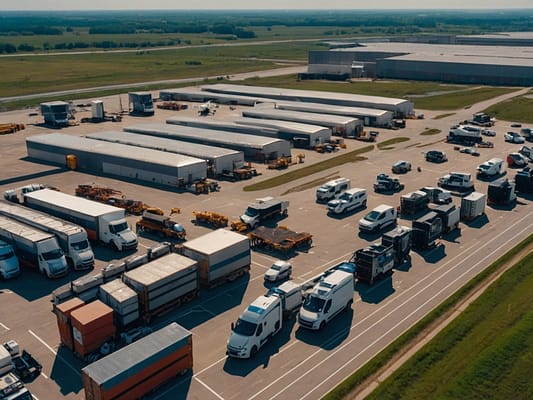The Future of Global Trade: How Emerging Technologies are Revolutionizing the Industry
In today’s fast-paced and interconnected world, staying ahead of technological advancements is crucial for success in global trade. Emerging technologies are not just changing the way we do business; they are redefining the entire landscape of international commerce. Companies that embrace these innovations will not only survive but thrive in this competitive environment. Did you know that the global edge computing market is projected to reach $15.7 billion by 2025? Such rapid growth is indicative of the transformative power of technology in global trade.
Edge Computing: Enhancing Efficiency and Reducing Latency
Edge computing represents a paradigm shift in data processing and analysis. By bringing computation and data storage closer to where it is needed, edge computing reduces latency and enhances efficiency. This is particularly crucial for industries requiring real-time processing and decision-making. For instance, in supply chain management, edge computing enables real-time data analysis at the network edge, providing immediate insights and faster response times. This improves logistics operations and allows businesses to adapt quickly to changing conditions. Additionally, edge computing enhances data security by processing data locally, reducing the risk of interception during transmission. However, implementing edge computing requires complex infrastructure and significant investment, posing challenges in integrating with existing systems. Managing and synchronizing data across multiple edge devices can also be challenging, potentially leading to data inconsistencies and difficulties in maintaining data integrity. Furthermore, edge devices may have limited processing power compared to centralized data centers, which may not be suitable for processing large volumes of data or complex analytics.
Quantum Internet: Revolutionizing Security and Communication
The quantum internet is the next frontier in secure communication, utilizing the principles of quantum mechanics to create virtually unhackable networks. Quantum key distribution (QKD) offers unbreakable encryption, ensuring data security and enhancing trust in international transactions. This technology also enables ultra-fast data transfer over long distances, improving the efficiency of global trade networks. However, quantum internet technology is highly complex and requires specialized knowledge to implement and maintain. Establishing a quantum internet infrastructure involves significant investment in new hardware and communication channels, leading to high initial setup costs and potential challenges in integrating with existing networks. Moreover, the quantum internet is still in its early stages of development and may not be widely available for several years, limiting immediate benefits and posing risks associated with adopting immature technology.
Biotechnology: Transforming Supply Chains and Product Innovation
Biotechnology is driving innovations across various industries, from agriculture to pharmaceuticals. It enables more sustainable agricultural practices and the development of bio-based materials, reducing the environmental footprint and increasing efficiency in production processes. Advances in biotechnology lead to the creation of new products, such as genetically engineered crops and biopharmaceuticals, opening new markets and driving growth in international trade. However, biotechnology is subject to strict regulatory scrutiny, which can vary significantly between countries, leading to potential delays and increased costs associated with regulatory compliance. The use of biotechnology, particularly in genetic engineering, raises ethical concerns and public resistance, potentially impacting market acceptance. Additionally, developing biotechnological solutions requires significant investment in research and development, resulting in high initial costs and potential financial risks associated with new product development.
Nanotechnology: Material Innovation and Enhanced Product Quality
Nanotechnology enables the creation of materials with superior properties, such as increased strength, lighter weight, and enhanced durability. This leads to the development of high-performance products that can compete more effectively in global markets. Nanotechnology also improves the quality and performance of a wide range of products, from electronics to textiles, increasing customer satisfaction and market demand. Moreover, nanotechnology contributes to environmental sustainability through innovations such as pollution remediation and energy-efficient materials. However, the long-term health and safety impacts of nanomaterials are not fully understood, posing potential risks and regulatory hurdles that could slow market adoption. The development and production of nanotechnology-based products can be expensive, limiting accessibility for smaller businesses. Additionally, nanotechnology is subject to varying regulatory standards across different countries, making compliance complex and costly.
Autonomous Systems: Increasing Efficiency and Reducing Labor Costs
Autonomous systems, such as drones and self-driving vehicles, can operate continuously and with high precision, enhancing logistics and transportation efficiency while reducing delivery times and operational costs. Automation also reduces the need for human labor in repetitive and dangerous tasks, lowering labor costs and improving workplace safety. Autonomous systems can be easily scaled to meet increasing demand without the constraints of human labor, providing flexibility to expand operations rapidly in response to market growth. However, developing and deploying autonomous systems require significant investment, resulting in high initial costs that may be prohibitive for smaller businesses. Autonomous systems rely on advanced technologies that can be complex to develop and maintain, with potential technical failures or malfunctions disrupting operations and incurring additional costs. Furthermore, the use of autonomous systems raises regulatory and ethical concerns, particularly regarding safety and job displacement, which could slow adoption.
Digital Twins: Enhanced Predictive Maintenance and Optimized Performance
Digital twins provide real-time simulations of physical assets, allowing for predictive maintenance and reduced downtime. This improves asset management and reduces operational costs. Digital twins also enable continuous monitoring and optimization of processes, enhancing efficiency and productivity across various operations. Access to real-time data and simulations supports informed decision-making, leading to better strategic planning and resource allocation. However, managing and integrating vast amounts of data from digital twins can be challenging, potentially leading to data silos and difficulties in ensuring data accuracy. Developing and maintaining digital twins requires significant investment in technology and expertise, resulting in high initial costs and ongoing maintenance expenses. Digital twins are also vulnerable to cyberattacks, which can compromise sensitive data and operations, increasing the need for robust cybersecurity measures and posing the risk of data breaches.










Future Trends and Predictions
As we look to the future, it is clear that these technologies will continue to evolve and drive innovation in global trade. Edge computing will become more widespread, with advancements making it more accessible and efficient. The quantum internet, though still in its early stages, will gradually become more integrated into secure communication networks, providing unparalleled data security. Biotechnology will see further breakthroughs, with more sustainable and innovative products entering the market. Nanotechnology will continue to revolutionize material science, offering new solutions for various industries. Autonomous systems will become more sophisticated and integrated into everyday operations, transforming logistics and supply chain management. Digital twins will become essential tools for predictive maintenance and optimization, enhancing operational efficiency across sectors.
Practical Tips and Advice
For businesses looking to leverage these technologies, it is essential to stay informed about the latest developments and trends. Investing in research and development can help companies stay ahead of the curve and identify the most relevant technologies for their operations. Collaborating with technology partners and industry experts can provide valuable insights and support during the implementation process. Businesses should also consider the regulatory landscape and ensure compliance with relevant standards to avoid potential legal and financial risks. Finally, focusing on cybersecurity measures is crucial to protect sensitive data and maintain trust with partners and customers.
FAQs
Q: How can edge computing benefit my business? A: Edge computing can reduce latency, enhance data security, and improve real-time decision-making, leading to more efficient operations and better supply chain management.
Q: What is quantum internet and how does it impact global trade? A: Quantum internet uses quantum mechanics to create secure communication networks, offering unbreakable encryption and ultra-fast data transfer, enhancing trust and efficiency in international transactions.
Q: What are the main challenges of implementing biotechnology in trade? A: Regulatory scrutiny, ethical concerns, and high development costs are significant challenges that businesses may face when implementing biotechnological solutions.
Q: How can nanotechnology improve product quality? A: Nanotechnology enables the creation of materials with superior properties, leading to high-performance products that are stronger, lighter, and more durable, enhancing overall product quality.
Q: What are digital twins and how do they benefit businesses? A: Digital twins are real-time simulations of physical assets that enable predictive maintenance and process optimization, reducing downtime and operational costs while enhancing efficiency.
Conclusion
The future of global trade is being shaped by groundbreaking technologies like edge computing, quantum internet, biotechnology, nanotechnology, autonomous systems, and digital twins. While these innovations offer numerous benefits, they also come with their own set of challenges. At TradeLink Solution, we are committed to navigating these complexities to provide our clients with state-of-the-art trading solutions. By carefully weighing the pros and cons, we aim to harness the potential of these technologies to drive efficiency, security, and growth in international trade. For more information about our services and how we can help your business thrive in the digital age.
Call to Action
If you’re interested in how these technologies can transform your business operations, contact us at TradeLink Solution for a consultation. Stay ahead of the curve and let us help you navigate the future of global trade.
Ryan Mason is the owner of TradeLink Solution, a leading provider of trading solutions that empower businesses to thrive in the global marketplace. With extensive experience in international trade and a strong presence in China, Ryan and his team are dedicated to facilitating seamless trade operations between North America and Asia.
TradeLink Solution Technological Leap: Pioneering the Future of Global Trade
TradeLink Solution, a leading provider of trading solutions, is acutely aware of the rapidly evolving landscape of global trade. To stay ahead and maintain its competitive edge, the company has embarked on a strategic initiative to invest in emerging technologies such as edge computing, quantum internet, biotechnology, nanotechnology, autonomous systems, and digital twins. By integrating edge computing into its logistics and supply chain management systems, TradeLink Solution reduces latency and enables real-time decision-making, significantly improving operational efficiency. The deployment of quantum internet technology ensures unbreakable encryption and robust data security, maintaining the integrity and trust of their global trading partners. Collaboration with biotechnology firms allows the company to develop sustainable and innovative products, meeting the increasing demand for eco-friendly solutions. Nanotechnology enhances product quality by creating materials with superior properties, leading to high-performance products that attract customer satisfaction and demand. The use of autonomous systems such as drones and self-driving vehicles in logistics operations reduces the need for human labor, lowers operational costs, and improves workplace safety. Meanwhile, digital twins provide real-time simulations of physical assets, enabling predictive maintenance and operational optimization. This comprehensive investment strategy positions TradeLink Solution to enhance efficiency, security, and growth, ensuring the company remains a leader in the industry. By embracing these advanced technologies, TradeLink Solution is not only addressing current challenges but also preparing for future opportunities, driving long-term growth and maintaining a competitive edge in the dynamic landscape of international trade.



